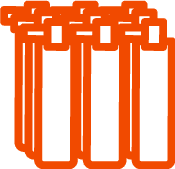
Home » Safety Tips
Cost-effective, reliable and quality CO2 gas products
We provide certified food-grade carbon dioxide (CO2) and mixed carbon dioxide and nitrogen (CO2/N2) to put the fizz behind your bar.
- Pure CO2 gas
- Mixed gas
- Pure Nitrogen
- Pure Helium
- Additional gas products
Handling your compressed gas with care

Assess your cellar to identify safety hazards
- Minimise risks by only allowing trained personnel into your cellar.
- Display clear warning signs that detail safety measures
- Make sure the cellar is sufficiently ventilated.
- Leaks from cylinders or hoses in confined spaces can deprive the atmosphere of oxygen, resulting in severe injury or death.
- Safe systems of working identify all the hazards and ensure that the necessary controls are in place.
- A CO2 sensor will detect the presence of carbon dioxide for the protection of personnel.

Never tamper with cylinders
- Only properly trained personnel should handle compressed gas cylinders.
- Only connect gas cylinders to primary regulators.
- Be aware that cylinders can become flying objects when cylinder valves are damaged or broken off.
- Never try to unscrew a cylinder’s valve fitting.

Handle cylinders correctly
- Cylinders must be handled and stored in accordance with Manual Handling Regulations 1992.
- Never drag, slide or roll cylinders. Carry cylinders using the handle or even use a cylinder trolley. Do not lift cylinders above chest height.
- Do not drop cylinders, strike them against each other or other surfaces violently.
- Do not use the valve cover to lift cylinders as this could become unattached. If the cylinder is dropped on a hard surface, it could cause an explosion.
- Do not force connections that do not fit.
- Do not directly handle a frosted cylinder.

Store cylinders correctly
- Gas cylinders must be secured at all times to prevent tipping. Do not stand cylinders on uneven floors.
- Use appropriate material such as chain or plastic coated wire cable to secure cylinders whether they are full or empty.
- Store cylinders in an upright position whenever possible.
- Do not expose cylinders to direct heat, sunshine or high temperatures.
- Gas cylinders must not be stored in public hallways or other unprotected areas.
- Cylinders must be protected from damage. Do not store cylinders where heavy objects may fall on them.

Do not overstock
- Overstocking increases the safety risk to your premises and your personnel.
- Calculate your cellar gas consumption and keep the minimum required to last you until your next delivery.

